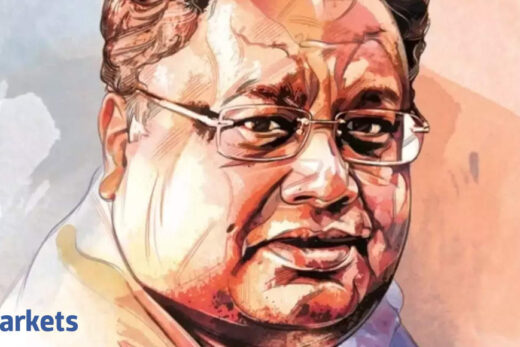When we were discussing the impact of the first Covid-19 wave, your words were – look there is an economy which is outside the comfort of IT and pharma and that is what exactly happened. What is your understanding of the impact of the second wave on the job market?
I think it is again unmodellable. The stock market represents the formal economy and the formal economy does not represent the real economy and that is a pre-existing condition. So the second wave is a little more unmodellable than the first one, not because of the national lockdown. I mean thankfully we did not go for the one-size-fits-all lockdown. People may think that was why this virus spread, but I think we have to look at the situation from a variant perspective.
The challenge is ‘
umeed pe duniya chalti hai, umeed pe duniya kayam hai’ as they said in Kashmir where I grew up. And you cannot plan dinner. You cannot plan a trip. You cannot plan a factory and at some point, that is starting to impact the mood here right now. Now obviously, all this depends on the vaccination. If we get to 40-50% vaccination, the economic scarring or what economists call hysteresis will not show up. But 14 months after the first wave, India has resisted what labour market economists call hysteresis. But I think if this vaccination does not get an overdrive, we have to be a little careful.
I am hoping that in the next three to six months, the vaccination can get fully on overdrive and then you will not have domestic consumption and demand holding up the economy. The world is back, but India’s consumption has held us up. That will start getting impacted if we do not get the vaccine to the levels that we need.
There was an absolute freeze after the first wave where every company wanted to cut costs and decided not to hire more. If I look campus recruitments and company outlooks, things are looking incrementally better. Is that the right way of looking at things? The impact of the second wave may be large and unquantifiable in terms of numbers, but is the impact on the real economy not going to be that large?
There were two unintended consequences of the first wave, people cut costs a lot. In fact, they cut it more than they should have. So, when the economy came back, they were struggling. But when they cut those costs, they realised that they were bloated in the middle. The pyramid had become a cylinder and now they are going back to being an Eiffel Tower. But the Eiffel Tower means a very broad base and so who they are recruiting and the noises that you are hearing are at the bottom of the pyramid.
Obviously younger people are cheaper than older people, and sales customer service, logistics also tends to be skewed towards younger people. So yes, you are seeing a comeback at the bottom of the pyramid hiring primarily because COVID has been a great revealer of pre-existing conditions and a great accelerator of trends like digitisation, e-commerce and many other areas. Logistics, sales, customer service which anyway are the three pillars that have held up the Indian economy in the last few years have really been accelerated by COVID.
I think that there is a light at the end of the tunnel for kids at the bottom of the pyramid willing to work in these areas. Obviously, I will keep saying that if we do not get the vaccination to the point that is critical mass, whether that 30-40% of the population, we are today only at 15% of the population. We need to get to 40-50% vaccination otherwise the ‘
umeed pe duniya kayam hai’ is always a challenge. It is like what Keynes called animal spirits. He was clear that throwing more labour, land, capital at the economy does not help if the mood is not fine. The global mood has come back so quickly in China, the US and other places. I think India was ready for that, but vaccination will be a big binary outcome on whether we go back to the pre-March 2020 levels of consumption, hiring, investment and everything else.
We have seen new job roles being created, like digital marketing roles, social media, AI, cyber security, etc. Do you think that now a skill set to adapt to technology is going to become far more relevant than it was and perhaps roles of freelancers are also going to increase?
The mandatory global digital literacy program which the lockdown has enforced on all age groups, all castes, all religions, and all countries is really an important part of the productivity super cycle that digitisation is driving. Now obviously, the leading indicators were the Indian IT services companies because there is no such thing as a technology company. Every company is a technology company, so you will see IT employment go from four million to 10 million probably in the next five years.
More importantly, India was always a laggard in what economists call total factor productivity but we did not have a Y2K problem because we skipped the learning. This digitisation super cycle for India will accelerate productivity. And digital literacy is a vocational skill, it is like English. People think English is a language, but English is a vocational skill in a country like India with 29 languages. The net impact of Covid on the digitisation super cycle will create barbell jobs. It will create jobs at the bottom in sales, customer service and delivery and obviously you will create a massive number of jobs at the top end because technology is no longer the preserve of technology companies. Every company is a technology company.
How are you seeing the overall general staffing trend shaping up in terms of comparing what we saw to the pre-Covid levels?
Overall Covid has reminded people that you cannot build capacity for peak load handling, you need to variablise your costs. I mean companies are rivers, they are not ponds and shareholders do not pay salaries, customers do. So, I think Covid has been a hearing aid for employers or an accelerant of the deconstruction of organisations. Organisations thought about permanent staff, but now they think about permanent staff, they think about third party contracts, they think about direct contracts, they think about consultants.
The complexity of people supply chains is really increasing and that overall is positive for staffing because employment has shifted from being a lifetime contract to a taxi cab relationship. Covid has accelerated that association of employment with offices and an employer. Work and employment are now diverging and so for staffing we are already back to where we were in March last year.
The trend will only accelerate structurally from this point. But obviously based on vaccination, based on the weather of the moment. I mean Covid is a passing storm, it is not climate change. But as of now, to all of us in the middle of the storm we have to be careful that vaccination is put on priority. I cannot emphasise that you know because confidence is a mind game and we have now decided, or employers and employees both have decided that vaccination will be the biggest rocket of this mind game.
We have looked at the demand and how things are normalising, but things will only normalise for the world when that demand is there and wage inflation comes back. Last year was about cost cutting, do you think this year we are unlikely to see anymore wage inflation or normalisation of salaries?
India should technically see no wage inflation. I mean, we have 200 million people sitting on farms or sitting in the informal sectors, if you think about the Lewisian turning point our wages should not have gone up. China wages did not go up between 1978 to 1998 till they joined WTO even though they moved 200 million people. I think whether at the moment, given that we will end the crisis with public debt at 90% of GDP – it has been 70% of GDP for the last 20 years – RBI’s balance sheet is substantially expanded. That fiscal and monetary policy has limited firepower. Of course, this is a once in a multi decade emergency, so we will stretch everything we can as a country.
But wage inflation will not show up in the short run, but in the long run structural reform will have to be accelerated. We saw some of that in labour, we saw some of that in farms, but we have to figure out how to make India a fertile habitat for job creation. Otherwise the scarring that Covid will leave on peoples’ psyche will be a labour market hysteresis. In the short run there is enough supply of labour. We cannot take jobs to people, we have to take people to jobs.
Migrants have come back and more migrants will come because not only were they not welcomed at home, they realised that they were not running to cities, they were running away from economic wastelands. So actually, migration is turning out to be another reason why wage inflation will be held down because if you think cities are hurting, rural areas are hurting even more economically.



